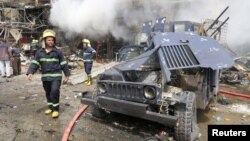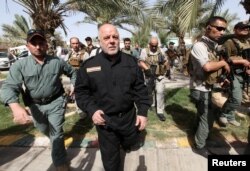Several suicide attacks killed more than 20 people Thursday in the Iraqi capital, Baghdad, despite the traditional truce for the Muslim holy month of Ramadan.
Thick clouds of black smoke poured from vehicles that caught fire following the explosion of a car bomb in Baghdad’s eastern district of al-Jadida. Pieces of metal and other debris littered the normally busy commercial thoroughfare, as stunned residents milled around.
A boy spoke with a policeman, explaining how he had seen a car explode minutes earlier.
Rescue workers pulled victims from the rubble, as ambulances ferried casualties to nearby hospitals.
Al-Jazeera TV reported the Islamic State group claimed responsibility for the car bomb attack in al-Jadida.
A second suicide car bomb blew up next to an army checkpoint in the northern Baghdad suburb of Taji, killing seven soldiers, according to Iraqi state TV.
Battle for Fallujah
The car bomb attacks Thursday coincided with the ongoing government offensive to recapture the Islamic State-held town of Fallujah, 40 kilometers west of Baghdad. Government forces and their Shi’ite militia allies say they have entered a southern district of the city.
Prime Minister Haidar al-Abadi insists the morale of government forces is high, during a visit to the front lines. He accused Islamic State militants of placing bombs in buildings, in vehicles and under roads, slowing down government forces. He also accused IS using residents of Fallujah as human shields.
Sunni leaders have also accused Shi’ite volunteer militiamen of beating and torturing some male residents who have fled the city. Arab media has shown amateur video of young men allegedly being tortured by those militias.
With sectarian tensions running high, government spokesman Saad al-Hadithi urged journalists not to broadcast rumors or other misinformation. He insisted reports of an alleged mass grave of army soldiers in a Fallujah suburb were not true.
Analyst Hilal Khashan, who teaches political science at the American University of Beirut, tells VOA the car bomb attacks in Baghdad may not necessarily be tied to the government offensive against Fallujah, but the group may be lashing out as it comes under pressure.
“This is Ramadan and radical movements, especially ISIS, launch suicide attacks on urban centers in Iraq during the month of Ramadan... and the Fallujah offensive is increasingly putting ISIS on the defensive and they are feeling the crunch, therefore they have an added reason to get involved in wanton suicide bombings,” said Khashan.
Arab media report that IS carried out 119 suicide attacks in Iraq, Syria and Libya during the month of May.







